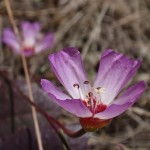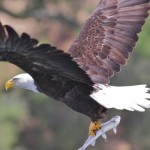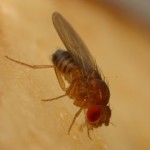 Biology
Biology

KQED Science
Why California’s Largest Estuary No Longer Works for Wildlife
Startling maps in a new report on the Sacramento-San Joaquin Delta show the dramatic loss of marshlands that once supported a vast array of wildlife.

QUEST
With GMO Labeling on the Ballot, Oregon and Colorado Learn From California Defeat
Voters in Oregon will head to the polls Nov. 4 to decide whether to require foods made with genetically engineered ingredients to be labeled. In doing so, they'll be voting on an initiative shaped in part by the experience of activists in California, who watched a similar measure fail ...Read More

KQED Science
New Research Shows Targeted Antioxidants Help Mice Live Longer, Healthier Lives
While many of the benefits of antioxidants are undoubtedly oversold, we do know that if given at high enough levels and targeted to the right place, antioxidants can help a mouse live 10-20% longer. If this holds up in people, that is equivalent to an extra 7-14 years for people here in the U.S.

KQED Science
Pygmy Seahorses: Masters of Camouflage
Tiny and delicate, pygmy seahorses survive by attaching to vibrant corals where they become nearly invisible to both predators and researchers. Now, biologists at the California Academy of Sciences have successfully bred them in captivity for the first time. Finally, they're able to study the seahorses' amazing act of camouflage up close.

KQED Science
Bay Area Scientists Artfully Present Their Research in Oakland Exhibit
“Experimental Space” is the latest show at Oakland art gallery Aggregate Space, consisting of images and videos created by scientists in the course of their research.

KQED News
3 Neuroscientists To Share Nobel Prize In Physiology Or Medicine
Copyright 2014 NPR. To see more, visit http://www.npr.org/. ...Read More

KQED Science
Restoring the Serpentine Prairie Habitat in Oakland
A highly endangered species exists on the urban edge of Redwood Regional Park in Oakland. Find out what volunteers and the East Bay Regional Park District are doing to protect and restore the serpentine prairie.

KQED Science
Genetic Tests May Have Unexpected Side Effects — Like Divorce
Direct-to-consumer (DTC) genetic tests are a fun way to learn about your family history, ancestry and maybe even a bit about your future health risks. But sometimes, they can also lead to unforeseen negative consequences.

KQED News
U.S. Gets Middling Marks On 2014 'State Of Birds' Report Card
All is not well with the nation's birds. The most comprehensive study ever of birds in America is out today, and it says many populations are in steep decline, even as others are doing well. The report, called "The State of the Birds," comes from the federal government, universities and ...Read More

KQED News
More Than Half of U.S. Bird Species Threatened by Climate Change
People in Maryland love their Baltimore orioles — so much so that their major league baseball team bears the name of the migrating bird. Yet, by 2080, there may not be any orioles left in Maryland. They migrate each year and, according to a new report, could soon be forced ...Read More

KQED Science
Fixing a Gene in a Fertilized Egg Prevents Muscular Dystrophy (in a Mouse)
Scientists recently fixed a broken gene in a fertilized mouse egg and prevented the mouse from getting an ultimately fatal form of muscular dystrophy. This study may one day translate into gene therapies that will treat and maybe even reverse certain effects of the disease.

KQED Science
West Coast Fish Upgraded to Sustainable Seafood Choice
One of the key fisheries on the West Coast is coming back after years of decline.

KQED Science
Pretty but Prickly: the Defenses of California Plants
Discover the beauty of sharpness and learn how to tell the difference between thorns, spines, and prickles.

KQED Science
The First Annual World Shorebirds Day Kicks off on September 6
Shorebird populations worldwide are declining, and endangered birds like the spoonbill sandpiper are facing extinction in the next five years. Learn about shorebirds who migrate to San Francisco Bay during winter months and how you can join the first annual "World Shorebirds Day" celebration.

KQED Science
A Glimpse of LUCA, Life’s Last Universal Common Ancestor
A new study suggests how early life might have survived without some of the cellular machinery that is absolutely required for life today. Turns out that having a fairly leaky membrane may have been the key.

KQED Science
San Francisco Wants to Know: Is Your Living Room Window Killing Migratory Birds?
Between 100 million and one billion birds die each year from colliding with glass windows of commercial or residential buildings. San Francisco is launching a program to track the damage caused by windows in homes.

KQED Science
A Family of Bald Eagles Grows in Castro Valley
Iconic bald eagles are capturing our hearts through nest webcams that showcase their family dramas online. Learn more about a local eagle family that fledged not one, but two young eagles this year at Lake Chabot Regional Park.

KQED Science
Some of Us May Have a Genetic Predisposition to Disliking Exercise
About 90% of us over the age of 12 fail to get as much exercise as we should. This is almost certainly not because we don’t believe in those benefits. Instead, it looks like at least part of the reason may be that some of us are genetically programmed to hate exercise.

KQED Science
Stanford Scientists Use Fruit Flies to Study Diabetes
Stanford researchers have developed a new way to use fruit flies to sort through the complicated genetics of Type 2 diabetes.

KQED Science
There’s a New Bird Species in California, Sort Of
When is a clapper rail not a clapper rail? Answer: when it's in California, as it turns out.






